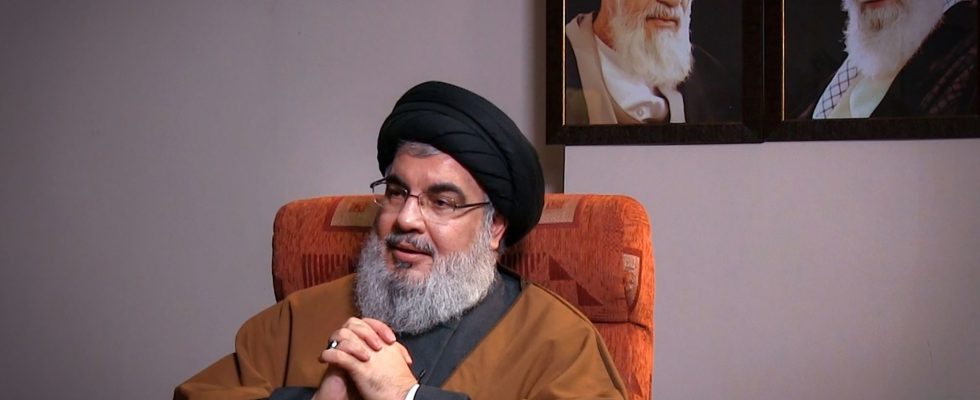On the airwaves of Al-Nour, a radio station based in Beirut and affiliated with Hezbollah, the listeners at the end of the line are stamping their feet. Like Hussein, originally from southern Lebanon, who only thinks of “going to fight for Palestine” and says he is ready to give Hassan Nasrallah “until [s]has the last drop of blood”. But three weeks after the bloody attacks of Hamas against the Jewish state, the charismatic leader of the Shiite party, who has made “the destruction of Israel” his leitmotif for thirty years and whose warmongering diatribes are expected across the Arab-Muslim world, remains silent. The war between Hamas and Israel has placed the country, where the wounds of the past are still raw, on the edge of the precipice. While some sharpen their weapons while waiting for a sign from the “hero” of the deadly 2006 conflict with the Hebrew state, the others are anxiously hanging on to a possible decision that could drag Lebanon into the abyss.
How did this son of a grocer from southern Lebanon become one of the most powerful figures in the Middle East? A child of the Lebanese civil war (1975-1990), it was during this dark page in national history that he formed himself intellectually around a thought impregnated by centuries of marginalization of the Shiite community. But it was the post-war period that provided him with the space to develop his vision and become the strategist we know.
After religious studies in Najaf (Iraq), in 1975 he joined the ranks of the Amal party founded by his lifelong idol, the religious leader Moussa Sadr. His political rise really took off when he joined the Islamic resistance in Lebanon, the beginnings of Hezbollah, in the summer of 1982. He became its secretary general ten years later, following the assassination of his predecessor, Abbas al- Moussaoui, killed by an Israeli raid in February 1992. “At the time, there were a lot of question marks over whether the relatively young Nasrallah would be able to take on Moussaoui’s mantle,” says expert Nicholas Blanford. from the Atlantic Council think tank.
In 2000, Nasrallah was elevated to the rank of hero
In the years that followed, Hassan Nasrallah paid particular attention to deepening the strategy and perfecting the military arsenal. From a small clandestine group operating in the 1980s in the mode of suicide attacks, Hezbollah is transformed into a professional body. Hassan Nasrallah, who continues to answer to the Supreme Guide and certain high-ranking members of the Iranian regime, becomes Hezbollah’s showcase. Both a religious authority figure and zaim (political leader). His public appearances are rare, but his increasingly frequent televised speeches provide him with a powerful platform.
On May 25, 2000, after twenty-two years of occupation, the last Israeli soldiers left South Lebanon for good. Hezbollah triumphs, Nasrallah is elevated to the rank of hero. “He ceased to be simply a political party leader and acquired regional stature,” notes Nicholas Blanford. This success is reflected domestically, in part thanks to the support of its Syrian ally, Bashar al-Assad. But the assassination of Prime Minister Rafic Hariri on February 14, 2005, which provoked the withdrawal of troops from Damascus after three decades of tutelage, will undermine the structure. Until the war against Israel in July 2006, where more than 1,000 Lebanese civilians lost their lives, but from which Hezbollah emerged victorious, propelling its leader to the zenith of his popularity. In the eyes of his supporters, “he then officially entered history to take his place among the greats”, notes Aurélie Daher, teacher-researcher at Paris-Dauphine University in her book Hezbollah. Mobilization and power (PUF).
Further south, the growing influence of Hezbollah continues to worry neighboring Israel. In 2010, Robert Gates, US Secretary of Defense, declared that Hezbollah had reached the point where “it has far more rockets and missiles than most governments in the world.” And from 2013, the group’s commitment to Syria to support the regime of Bashar al-Assad allowed it to strengthen its field experience. According to the latest estimates, Hezbollah has nearly 150,000 rockets and missiles.
More and more divisive
On the regional scene, Hassan Nasrallah lost part of his prestige following the Arab Spring uprisings. The predominantly Sunni public which, until yesterday, saw in him a local Che Guevara, now takes a dim view of the adventures of the “party of God” in Syria or Yemen. The secretary of the organization then ventured into new territory in Lebanon. In addition to political and military issues, he castigates homosexuality and defends early marriages… The leader is increasingly dividing society. Some revere him, to the point of making his person an object of worship; others see in him the origin of all evils, to the point of ignoring the excesses of the rest of the political class.
Accused of corruption and blackmail of violence, Hassan Nasrallah was booed in public during the October 2019 uprising. His growing unpopularity in Christian circles threatens to isolate him politically. Even within the Shiite ranks, critical voices, although in the minority, are being heard. The assassination in early 2021 of Shiite intellectual and opponent Lokman Slim reflects these strong tensions.
The political base and military power nevertheless allow it to control the situation. Until recently, the regional environment is in good shape. The Saudis and Iranians are speaking again, the survival of the allied regime in Damascus is assured. Nearly three weeks after the Hamas offensive in Israel, Hezbollah and its Iranian sponsor are holding the region hostage. If they decide to do so, they have the means to cause widespread conflagration. But they also have everything to lose: both Hassan Nasrallah and Supreme Guide Ali Khamenei know this. If they tempt the devil too much, the empire they have built over the last forty years could falter.
.
